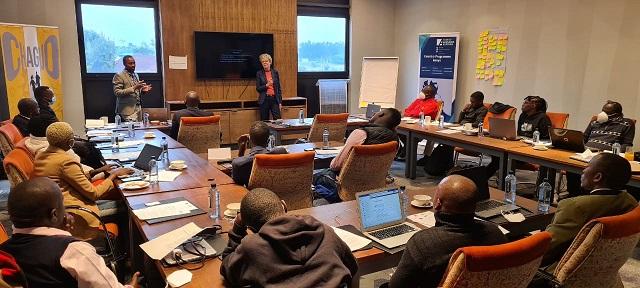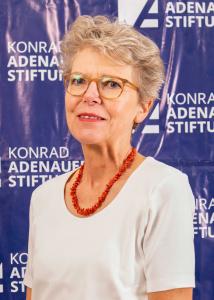By Johanna Metz
Fine antennas
Party foundations abroad - a look at Kenya, Brazil and Turkey
Walter Glos sounds sad on the phone. Since one of the worst earthquakes in recent decades shook southwestern Turkey on February 6, 2023, the country has been in a state of emergency - and the foreign office of the Konrad Adenauer Foundation (KAS) in Ankara has been doing almost nothing since then. "Almost all state institutions, but also many partner organisations with whom we work all over the country, are dealing with the consequences of the quake," says the office manager. "It's anything but business as usual here," he regrets. The CDU-affiliated foundation had to cancel all its projects for the time being.
The political foundations of the SPD, FDP and Greens are in the same situation as the KAS. They have been active in Turkey for many years, carrying out political education work, as in many other countries around the world, organising events and exchanges, promoting independent media, awarding scholarships and seeking dialogue on topics that are important for bilateral relations. The catastrophe now presents them with new challenges, both organizationally and conceptually. "The political consequences of the earthquake are still unclear, and reconstruction does not only have an economic dimension," says Henrik Meyer, head of the office of the SPD-affiliated Friedrich Ebert Foundation (FES) in Istanbul, referring to the millions of people who have become internally displaced persons as a result of the quake. "As a social democratic foundation that deals with good work and social justice, we naturally ask ourselves what issues arise for us." With his nine employees, including eight Turkish local staff, he is currently in a "thought process".
Sensitive topics The six foundations funded by the federal budget in Germany (see info boxes) have foreign offices all over the globe, in the states of the Global South as well as overseas, in the Arab world or the Asian successor states of the Soviet Union. The idea came from Federal Chancellor Konrad Adenauer (CDU) in 1961, who also launched the Federal Ministry for Economic Cooperation and Development (BMZ) in the same year. Both institutions should support the young states of Africa and Asia in their development and the development of the economy, but the foundations should be independent of the federal government - although they receive money from the pots of various federal ministries, they expressly do not act on their behalf. Rather, their foreign offices independently set thematic priorities. They look for their own local partners and are not bound by the neutrality requirement of interstate relations.
The international work of German foundations in this form is unique in the world. And it opens doors that sometimes remain closed to diplomacy, "We can do other things because we are perceived differently than, for example, the embassies," confirms Walter Glos. This is a "great advantage" for Germany and its international relations.
The CDU and SPD have been represented in Turkey with their foundations since the 1980s. While the FES mainly cooperates with trade unions and civil society organisations, KAS cooperates closely with political parties and parliaments and seeks dialogue with business and foreign and security policy actors. On the Bosporus, this means also addressing issues that have been causing tensions in german-Turkish relations for decades: migration, EU integration, the rule of law.
"Our advantage is that we have antennas in both directions," says Henrik Meyer. "We can bring German voices into the Turkish debate and Turkish voices into the German debate. In this way, we can often convey different insights than, for example, diplomats." In this way, employees in Turkey should also benefit from the commitment of the Ebert Foundation. Since the law on due diligence in supply chains came into force in Germany on 1 January 2023 and suppliers abroad have to ensure compliance with human rights as well as environmental and social standards above a certain employee size, the FES has brought together trade unionists from both countries so that the law actually leads to better working and production conditions locally.
New momentum Almost 11,000 kilometres away from Ankara as the crow flies, Annette von Schönfeld is dealing with completely different topics. For almost six years, she has headed the Heinrich Böll Foundation's international office in Rio de Janeiro, where she works with nine employees and in cooperation with Brazilian non-governmental organizations and universities on core green issues: human rights, gender issues, energy transition, environmental policy. Media promotion is also on the agenda "to counter the extreme right in Brazil, which is very strong on the Internet and in non-mainstream communication". At the end of last year, the foundation organized a meeting with influencers and podcast makers, among other things, which met with "great interest," says von Schönfeld.
The foundation could do a lot more, she says. "Brazil is an incredibly large country with many challenges. And we have many doors open to interesting players."
In January 2019, however, after the election of right-wing populist politician Jair Bolsonaro as president, the German party foundations represented in Brazil were worried. In addition to the Böll Foundation, KAS, FES and the Rosa Luxemburg Foundation, which is close to the Left Party, also have offices in the country, fearing that they would not be able to continue their work in this way. "We expected that there would be many obstacles," says von Schönfeld. "But due to the corona pandemic, a lot has been left behind in everyday political life." The announced confrontation with civil society organisations did not take place, "and we were able to continue working normally". However, violence and conflict against environmental activists and indigenous leaders have increased, "and some of our partners have had problems getting money from the banks from abroad." Now von Schönfeld hopes that under left-wing President Lula da Silva new momentum will come into the work - especially in environmental policy. "The channels of communication are open again and many organizations are looking for exchange with us."
Annette Schwandner found a similar openness in Kenya, where she took over the management of the country office of the Konrad Adenauer Foundation in Nairobi almost two and a half years ago. There, shortly before the Kenyan elections, however, she faced a different challenge: In the East African country, there were no parties that would have been comparable to the German ones, she reports on the phone. "These were more or less spontaneous associations that served to put people from different tribes in positions." In previous elections, it was correspondingly turbulent and often violent, she says. As the elections approached in the summer of 2022, she asked the politicians how they imagined the election campaign this time and what topics they wanted to compete with. "Little came back. They didn't realize that it wasn't enough to say my name was So, please vote for me."
Schwandner and her staff then supported the two partner parties of KAS in Kenya in preparing for the elections. Together with them, they developed concrete election programmes ("from the initial idea to printing") and trained local election workers. For the latter, KAS developed an app to reach helpers in more remote regions.
Schwandner reports on election day with audible pride. "It was more peaceful and well organized than ever. People stood in an eternally long line from six o'clock in the morning and waited patiently until they were let in and received their ballot papers. I've never experienced anything like this."
Great skepticism However, it is not self-evident that party foundations abroad can work as freely as in Kenya or Brazil. In recent years, many governments have passed laws to make the activities of foreign organisations more difficult or even prevented, for example in Russia. Only the "Agent Act" passed in 2012 led to considerable restrictions. In April last year, the Russian authorities finally withdrew the registration of all German party foundations; they had to stop working.
In Egypt, dozens of NGO workers, including two KAS representatives, were sentenced to long prison terms in 2018 for unlawful foreign funding and incitement; the foundation staff and some other detainees were acquitted only after international protests. Here, as in Afghanistan and Myanmar, the Foundation no longer has any offices.
Working in Turkey "has always been a bit complicated for organizations like us," says FES representative Henrik Meyer. In the 35 years of its presence, there have been difficult moments for the foundation, "in which it was not always clear whether we could continue our work". Recently, the situation has worsened again. New bureaucratic requirements and complicated reporting and proof obligations made the work tedious, report the foundation employees.
"We are always in focus here," says Walter Glos from KAS. Especially in the case of activities in the field of civil society, freedom of expression and freedom of the press, the room for manoeuvre is rather limited. "And especially before elections, topics such as the rule of law and electoral security are of course not welcome." But Glos is open about it. "I confront the relevant actors with it. In addition, I always involve the necessary government agencies and they are always invited to participate in the events." Ultimately, he believes, "the political leadership appreciates that we are doing things that are of particular importance to the country and relations with the EU and Germany."
In addition, there is still a very lively civil society in Turkey, adds Meyer. "She can't be shut up and discusses much more critically than we often think." FES therefore easily finds the partners with whom it wants to work.
Both foundation representatives hope to be able to resume their work in the course of the month. Despite all the obstacles and challenges, this is essential, says Meyer. "For us, it's about social exchange and the preservation of open spaces. This is important for the future of a democracy, whether in Turkey or elsewhere."




